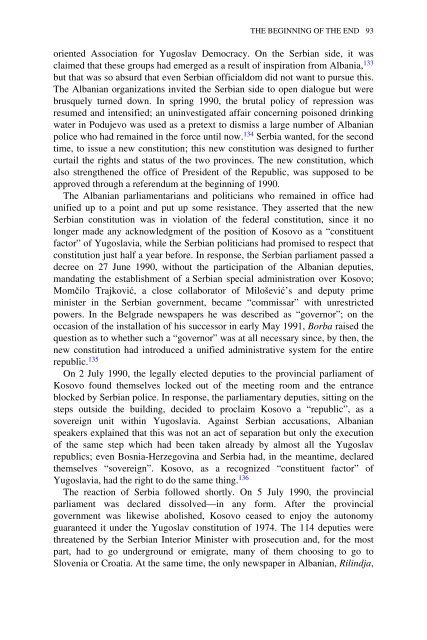Yugoslavia: A History of its Demise - Indymedia
Yugoslavia: A History of its Demise - Indymedia
Yugoslavia: A History of its Demise - Indymedia
You also want an ePaper? Increase the reach of your titles
YUMPU automatically turns print PDFs into web optimized ePapers that Google loves.
THE BEGINNING OF THE END 93<br />
oriented Association for Yugoslav Democracy. On the Serbian side, it was<br />
claimed that these groups had emerged as a result <strong>of</strong> inspiration from Albania, 133<br />
but that was so absurd that even Serbian <strong>of</strong>ficialdom did not want to pursue this.<br />
The Albanian organizations invited the Serbian side to open dialogue but were<br />
brusquely turned down. In spring 1990, the brutal policy <strong>of</strong> repression was<br />
resumed and intensified; an uninvestigated affair concerning poisoned drinking<br />
water in Podujevo was used as a pretext to dismiss a large number <strong>of</strong> Albanian<br />
police who had remained in the force until now. 134 Serbia wanted, for the second<br />
time, to issue a new constitution; this new constitution was designed to further<br />
curtail the rights and status <strong>of</strong> the two provinces. The new constitution, which<br />
also strengthened the <strong>of</strong>fice <strong>of</strong> President <strong>of</strong> the Republic, was supposed to be<br />
approved through a referendum at the beginning <strong>of</strong> 1990.<br />
The Albanian parliamentarians and politicians who remained in <strong>of</strong>fice had<br />
unified up to a point and put up some resistance. They asserted that the new<br />
Serbian constitution was in violation <strong>of</strong> the federal constitution, since it no<br />
longer made any acknowledgment <strong>of</strong> the position <strong>of</strong> Kosovo as a “constituent<br />
factor” <strong>of</strong> <strong>Yugoslavia</strong>, while the Serbian politicians had promised to respect that<br />
constitution just half a year before. In response, the Serbian parliament passed a<br />
decree on 27 June 1990, without the participation <strong>of</strong> the Albanian deputies,<br />
mandating the establishment <strong>of</strong> a Serbian special administration over Kosovo;<br />
Momčilo Trajković, a close collaborator <strong>of</strong> Milošević’s and deputy prime<br />
minister in the Serbian government, became “commissar” with unrestricted<br />
powers. In the Belgrade newspapers he was described as “governor”; on the<br />
occasion <strong>of</strong> the installation <strong>of</strong> his successor in early May 1991, Borba raised the<br />
question as to whether such a “governor” was at all necessary since, by then, the<br />
new constitution had introduced a unified administrative system for the entire<br />
republic. 135<br />
On 2 July 1990, the legally elected deputies to the provincial parliament <strong>of</strong><br />
Kosovo found themselves locked out <strong>of</strong> the meeting room and the entrance<br />
blocked by Serbian police. In response, the parliamentary deputies, sitting on the<br />
steps outside the building, decided to proclaim Kosovo a “republic”, as a<br />
sovereign unit within <strong>Yugoslavia</strong>. Against Serbian accusations, Albanian<br />
speakers explained that this was not an act <strong>of</strong> separation but only the execution<br />
<strong>of</strong> the same step which had been taken already by almost all the Yugoslav<br />
republics; even Bosnia-Herzegovina and Serbia had, in the meantime, declared<br />
themselves “sovereign”. Kosovo, as a recognized “constituent factor” <strong>of</strong><br />
<strong>Yugoslavia</strong>, had the right to do the same thing. 136<br />
The reaction <strong>of</strong> Serbia followed shortly. On 5 July 1990, the provincial<br />
parliament was declared dissolved—in any form. After the provincial<br />
government was likewise abolished, Kosovo ceased to enjoy the autonomy<br />
guaranteed it under the Yugoslav constitution <strong>of</strong> 1974. The 114 deputies were<br />
threatened by the Serbian Interior Minister with prosecution and, for the most<br />
part, had to go underground or emigrate, many <strong>of</strong> them choosing to go to<br />
Slovenia or Croatia. At the same time, the only newspaper in Albanian, Rilindja,
















